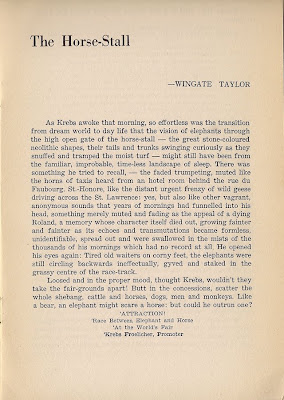The editor of this mag, John Sutherland, is a very decent chap, about 30, a pretty good drinker too...The April & May 1945 issue of influential Montreal little magazine First Statement. Irving Layton, A.M. Klein, Patrick Anderson, Ralph Gustafson, Miriam Waddington... amongst the lesser-known writers we find Wingate Taylor, "a farmer in the Eastern townships [sic] of Quebec." He's better remembered – though, in truth, he's barely remembered at all – as Graeme Taylor, the man who shares many adventures with John Glassco in Memoirs of Montparnasse.
– John Glassco, letter to Robert McAlmon, 16 August 1944
I've long been fascinated by Taylor, in part because he was expected to do such great things. Writing in the 'twenties, Leon Edel described him as one of the three premier Canadian writers of his generation, while A.J.M. Smith recommended his writing to anthologist Raymond Knister. I read nothing of Taylor's that would justify such praise, but it appears Edel and Smith weren't alone in seeing something; while living in Paris, Taylor's writing appeared in This Quarter and transition, sharing pages with James Joyce, Gertrude Stein, Paul Bowles and William Carlos Williams.
Taylor's lone contribution to First Statement, "The Horse-Stall" broke a fifteen year silence, marking his first appearance in print since those days in Montparnasse. It was also his last.

"The Horse-Stall" isn't a short story, but an excerpt from a lost, unpublished novel titled Brazenhead. The twelve pages in First Statement is all that survives – an apt reflection of a man who, as Michael Gnarowski has written, "remains unrealized and obscure to the present day."
A shorter, earlier version of this piece was cross-posted at A Gentleman of Pleasure.















